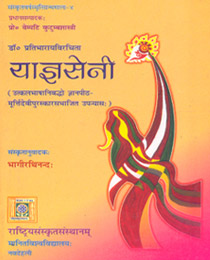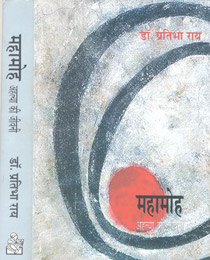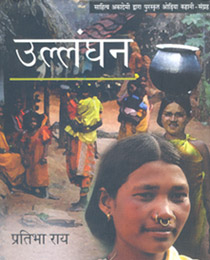





Literary Profile:
Began writing poetry at the age of nine and switched over to short story in her college days. Later she turned to writing novels. Yet poetry seemed to live deep in her. She continues to write lyrics and poetry in Odia. Writing fiction has grown into a bond and companionship for the past forty years of her life.
Ray began her creative career as a young poet and wrote her first novel as a novice, titled “Barsha-Basanta-Baishakha” (The Rain, Spring and Summer, 1974) which immediately captured the hearts of Odia readers. Later, even as she branched out to explore the more hidden recesses of the human psyche and character, she contributed to use the same colloquial style with an eye for the odd detail that became the hall-mark of her fiction, including the best of her tales. Although her literary focus is on psycho-social analysis of people, tribes and characters, Pratibha grapples with issues of contemporary relevance, oppressive surroundings, over powering tension of modern life, corruption and degeneration of values in every sphere, a growing hedonism and the alienation of the individual in a complex modern society.
Ray is powerfully drawn to history and legends and often builds intricate narratives around themes that are part of the racial consciousness. Pratibha’s fascination for the historic past finds full expression in her novel “Shilapadma”, a profoundly moving work on the legends associated with the world famous Sun temple at Konark, Odisha. “Uttarmarg”, based on suffering of neglected heroes of freedom struggle in rural Odisha where she was born, established her as one among the great novelists of Odisha.
Researching in the realms of mythology, Pratibha reconstructed the life of Draupadi, the enigmatic heroine of Mahabharata in a feminist mode in her successful novel Yajnaseni. Written in an epistolary mode, the novel, available in translation in English (Rupa & Co), made an important contribution to this genre at the all India level. Her novel “Mahamoh” is a classic work on Vedic culture which elevates the misunderstood and misinterpreted vedic characters, especially “Ahalya” from biological self to ontological being. It is considered to be a work of great myth making and demystifying of frosty metaphysics. It is a landmark in the Indian fiction scene. It is through such myriad gestures that Pratibha Ray’s characters break out of the prison-house of the self and live a life of fulfillment.
Her research on the life style and behaviour of Bondo highlanders took her to the remote hills of Koraput district of Odisha at a time (1985) when people were apprehensive of confronting the savage tribals. An intimate study of the Bondo life finds expression in “Bhagabanara Desh” (Land of God) a collection of short stories, and her novel “Aadibhoomi” (Primal Land), This classic novel has become a landmark in Indian literature. She worked tirelessly in the cyclone-affected areas in the after-math of the Super Cyclone of Odisha, 1999. Her classic novel “Magnamati” based on the Super Cyclone is a great fictional work which unravels the mystery of life and death, man’s love for life and courage to fight against devastating natural calamity. “Maharaniputra” (Son of the Queen) (2008) is a great fictional work based on the historical Bhuyan (tribe) revolution against the King where the father of modern Odia fiction Late Fakir Mohan Senapati was the Dewan. He was instrumental in suppressing the revolution and helped the British police arrest the tribal hero Dharanidhar Bhuyan. The young and patriotic Dharanidhar ultimately led a tragic life till death. Her significant research work on five primitive tribes of Odisha – “Rediscovering and Revitalising the primitive tradition of Man in myth and tale”, is a treasure for folk literature.
Ray’s fictional world is not an imaginary landscape. It is routed in a concrete socio- historical reality and Odisha’s rich cultural heritage. Her main strength lies in her ability to employ the traditional mode of narration in order to depict the changing patterns of Odisha’s primarily rural culture. Remaining within the cultural cocoon Pratibha’s creative vision have made her works universal. In her tales. Pratibha seems to prefer the dissidents, the drop-outs or the odd-ball rather than heroes and heroines in the aristocratic sense of the term. Her fictional world suggests a constant spirit of questioning and search for the meaning of life. Many of her stories and novels such as Adibhoomi, published in a translated form by Orient Longman, use a powerful tribal setting. Although Ray’s locales vary with the story line and the inevitable denouement, there is always a discernibly unique thematic and narrative pattern in her fictional landscape. Whether it is “Shapya” (The Curse) that received the Katha Award for 1994 or others such as “Bipralamba”, or translated stories like “The Gentleman”, “Hunger”, “The Other God”, “The Untouchable God” or “The Mango Tree”, Ray excels in the leisurely unfolding of the drama of human emotions. In most of such tales, the actual “event”, “happening” or plot plays a subordinate role. The focus of attention in the bulk of these realistic works is not on the “happening” though there is the inevitable tour de force in many stories, as in the best of Chekhov or O’ Henry.
Ray’s stories are unsparing in their indictment of social evils and injustice. Bigotry and obscurantism of all kinds are her particular bete-noir as in “The Other God”, a story that offers a savage critique of the so called “civilized” behaviour of man. In this story as well as the equally moving “The Untouchable God”, Ray shows us the evil side of blind religiosity that negates the drive for human fellowship. While a faith in the genuine spiritual is always affirmed, such as in the story “Chandrabhaga and Chandrakala” (Weaning of the moon), a great many of the tales seem to question the claims of tradition and authority. In Ray, such interrogation often leads her to question patriarchal modes of conduct and belief. She, of course, chooses to describe herself as pro-woman rather than as a feminist. This attitude has varied manifestations in stories such as “Moksha” (The Salvation) where a couple Shoshi and Nuri Das live together under one roof for forty long years, yet neither speak nor see each other’s face. Or it may be expressed through the use of masterly irony, depicting a complex trade-off between the need for sexual identity and social respectability as in “Shapya”.
She has 21 novels, 24 short story collections, 10 travelogues, 2 books of thought provoking Essays, 1 collection of lyrics, 1 poetry collection and her widely read and highly appreciated autobiography “Amrit Anwesha” (In search of Nectar) which was serialized in a literary magazine for the last nine years along with some books for children and neo-literates to her credit; a short biography in English on Kuntala Kumari Sabat in the series of Makers of Indian Literature by Sahitya Academy,has translated three books into Odia from Hindi. Sanskrit version of Jajnaseni has been introduced in the M.A and B.A course in few prestigious Indian universities. This book also has the unique distinction of being one among forty books included in the first e-library, initiated by the India government. Some of her stories are included in the Syllabi of School and Colleges in Odisha and other states as well as by NCERT. Ten students have been awarded Ph.D degree researching on her literary works. Students from foreign countries have also researched extensively on her literary works.
Among the contemporary fiction writers of Odisha, Pratibha Ray is widely translated, perhaps the best known and widely read voice in Odisha and India. Her translated works appear regularly in different Indian languages.
Pratibha’s novels contain a variety of subject matter and interest. At the same time, she has adopted appropriate techniques to suit the particular theme and discourse. Her motivations too, vary, and she tries to bring different levels of perception in one structure.
Pratibha believes in one God- conscience, one religion – humanism and one language – the language of Love.






